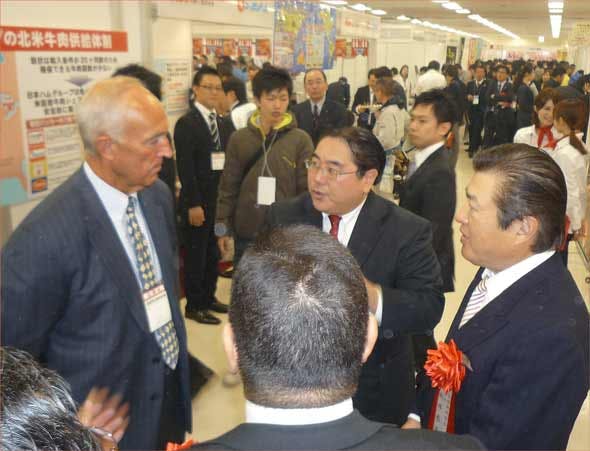Yakiniku Business Fair Shows Signs of Optimism
Published: Jan 26, 2012
The Japanese yakiniku industry has suffered in recent years as age limitations on U.S. beef have cut into the supply of product that chefs prefer to serve. But there was no sign of hesitation on the faces of more than 12,000 participants at the Yakiniku Business Fair last week in Tokyo, where talk was of optimism for an industry rebound.

The $10 billion yakiniku industry in Japan – known for its distinctive style of tabletop grilling – has relied on U.S. beef products including chuck rib, boneless short rib, tongue and outside skirt to meet the demand for grain-fed red meat favored by Japanese consumers.
USMEF was active at the two-day fair, promoting both U.S. beef cuts as well as branded U.S. pork products that offer a good fit with yakiniku-style cooking, including belly and jowl meat. USMEF’s participation was supported by the USDA Market Access Program, the Beef Checkoff and Pork Checkoff programs.
Currently Japan limits U.S. beef imports to products from cattle 20 months of age or younger, although the government of Japan is in technical discussions to determine if that age limit should be raised.
“We understand the close relationship between U.S. beef and yakiniku,” said Dan Halstrom, USMEF senior vice president of marketing and global communication. “While there is potential for the beef market in Japan to expand if the age limit is raised, we also see a great fit between U.S. pork and yakiniku.”
The pork market in Japan is hotly contested, with more than 400 domestic brands alone. However, U.S. pork has made significant inroads in the market, earning the distinction of being the No. 1 imported pork for the past seven years, capturing 41 percent of the imported pork market share while accounting for 22 percent of the volume and more than 32 percent of the value of all U.S. pork exports.
President and CEO Philip Seng joined the USMEF team at the yakiniku show and met with the chairman of the All Japan Yakiniku Association and president of the popular yakiniku restaurant Jyojyo-en to discuss opportunities to increase access for U.S. red meats.
“There is no question that there is a close relationship between Japanese yakiniku and U.S. red meat,” said Seng. “USMEF has conducted a number of very successful and highly visible yakiniku promotions, and we look forward to many more in the future. Any easing of import conditions, particularly those that would enable the import of variety meat, would be advantageous to both sides.”
USMEF was active at the two-day fair, promoting both U.S. beef cuts as well as branded U.S. pork products that offer a good fit with yakiniku-style cooking, including belly and jowl meat. USMEF’s participation was supported by the USDA Market Access Program, the Beef Checkoff and Pork Checkoff programs.
Currently Japan limits U.S. beef imports to products from cattle 20 months of age or younger, although the government of Japan is in technical discussions to determine if that age limit should be raised.
“We understand the close relationship between U.S. beef and yakiniku,” said Dan Halstrom, USMEF senior vice president of marketing and global communication. “While there is potential for the beef market in Japan to expand if the age limit is raised, we also see a great fit between U.S. pork and yakiniku.”
The pork market in Japan is hotly contested, with more than 400 domestic brands alone. However, U.S. pork has made significant inroads in the market, earning the distinction of being the No. 1 imported pork for the past seven years, capturing 41 percent of the imported pork market share while accounting for 22 percent of the volume and more than 32 percent of the value of all U.S. pork exports.
President and CEO Philip Seng joined the USMEF team at the yakiniku show and met with the chairman of the All Japan Yakiniku Association and president of the popular yakiniku restaurant Jyojyo-en to discuss opportunities to increase access for U.S. red meats.
“There is no question that there is a close relationship between Japanese yakiniku and U.S. red meat,” said Seng. “USMEF has conducted a number of very successful and highly visible yakiniku promotions, and we look forward to many more in the future. Any easing of import conditions, particularly those that would enable the import of variety meat, would be advantageous to both sides.”
